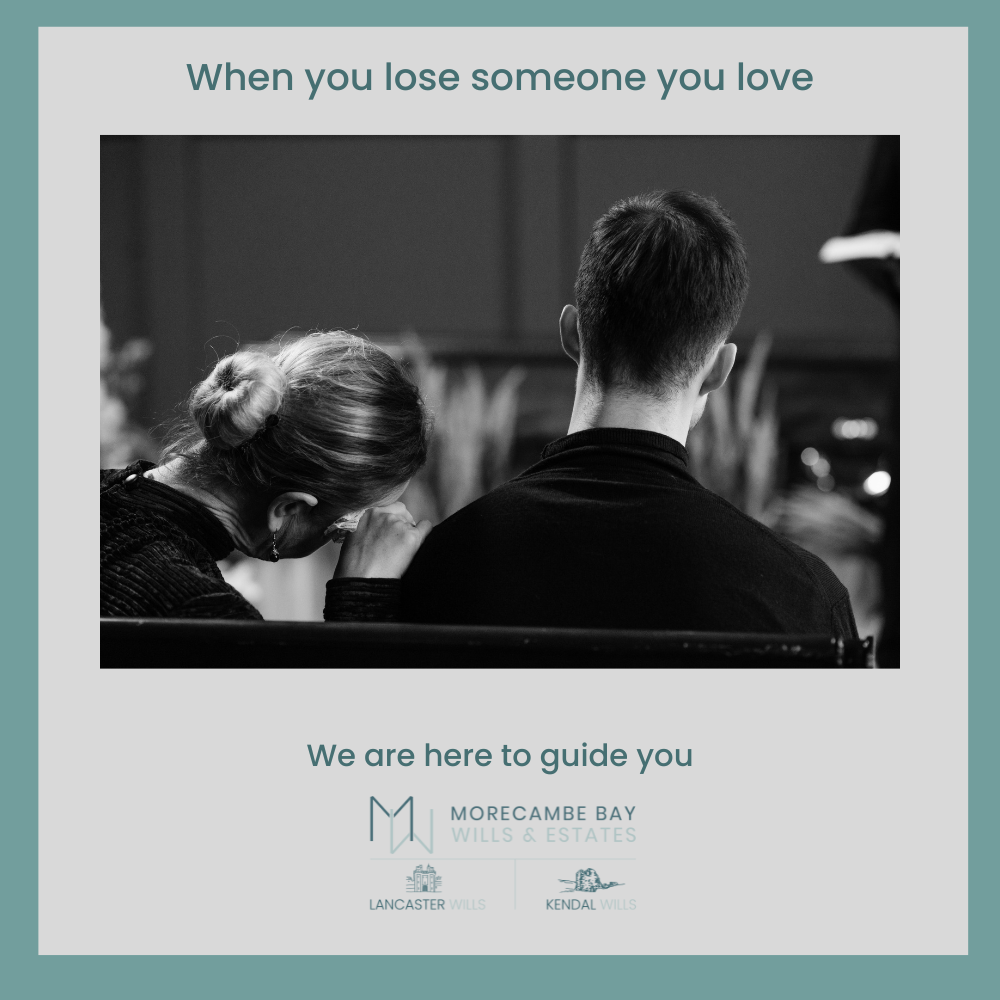Most weeks we get a sad call in the office asking what to do when someone dies. Losing a loved family member or friend is something so hard. It’s such a difficult time, and many of us have little experience of what happens next.
This is by no means a comprehensive guide. But here are some simple things that you, as next of kin, or Executor of a Will, may need to consider. We hope it is useful but remember, we are here to help and answer any questions you may have.
Informing the right organisations
The first thing to do when someone dies is to register the death. You, or the next of kin, need to do this within 5 days. Your local registrar will normally contact you to arrange an appointment for you to provide details. They will issue an official “Death Certificate”, which authorises the Funeral Director to act. We always recommend you also purchase a few “certified copies” of this important document. You will need it for various organisations in the coming weeks. They cost £11 each – keep receipts of any expenditure as this will be needed later.
You should also tell government agencies about the death too. You can do this easily using the “Tell us Once” service. The Registrar will give you a code to use online. It’s quite simple and informs organisations like DWP, DVLA, Council Tax etc.
You should also start to inform other financial institutions, like banks, private pension and insurance companies. Some will release monies from accounts whilst others may require a “Grant of Probate” (see below). You may also need to inform utility companies. If a house Is unoccupied, you will need to arrange specialist household insurance too. Make sure you keep detailed records. Information you have been given, expenses you have paid and any monies that have been collected.
Remember that Powers of Attorney are no longer valid when someone dies. So you can’t continue to make decisions or take actions on any financial matters. When you notify organisations of your loved one’s death, they will normally freeze accounts (other than joint accounts).
Finding a Will

When someone dies, one of the first things you may need to do is find out if they left a Will. That may give instructions about their funeral wishes. It will also appoint “Executors” – those who have the legal authority to deal with the estate.
Hopefully, you will know where this is kept, so this should be straightforward. If not, you may need to try to find it. Maybe by calling local legal firms, or by conducting a search with organisations like the National Will Register.
If you need advice about searching for a Will (or checking there isn’t a later Will than the one you have), call us. We are here to help.
The Executors in the Will, or the next of kin if there isn’t a Will, are responsible for organising a funeral.
Organising a funeral
In most cases, when someone dies, the funeral is organised by a funeral director. Check if your loved one / friend had a pre-paid funeral plan. Or maybe left instructions or wishes about the type of service they had wanted. When we prepare Wills for our clients, we provide them with a “Funeral Wishes Letter”. This allows them to record their thoughts and wishes. This type of document is particularly useful – some people leave it with their will and others in a safe place. If you’ve done this, please do let your family know. It is one of the kindest things you can do for them at this time.
Our advice is to take your time around this period. Don’t try to do too much in terms of other administration work. Banks will have frozen accounts once you have notified them. However, they will usually release funds directly to pay the funeral bill if required.
You can start to think about other actions that may be needed when you are ready.
Property
Most estates contain a property when someone dies. You will need to ensure it is secure if it is left unoccupied . You will also need to inform the insurance company – and arrange unoccupied property insurance. This is because the risk of burglary, damage, flood etc is higher. There are specialist insurance companies that can help – ask us for details if you would like some more information.
A Grant of Probate is needed if the property is going to be sold or transferred to a new owner. Or to a beneficiary of the Will. The exception is if it is being transferred to the other “joint beneficial owner”. There are forms to be completed for the specific circumstances.
If the Will contains a trust for the property, this will need to be registered with HMRC. You need to so this within a defined timescale. We would also advise you to register the interest of the trustees on HM Land Registry too. You can do this after probate has been granted.
Ask us if you need help in understanding what is required!
Probate

When someone dies, their estate is likely to have to pass through “probate”. This is the process of “proving” a Will and giving the Executors the legal authority to deal with the estate. The document issued is called a “Grant of Probate”. Where there is no Will, “Letters of Administration” are issued in a similar way. They are issued to the person authorised to deal with the estate. This is normally the next of kin. However, that process can be more onerous and take much more time than if a Will was in place.
The first step is to value the estate – put simply … “what was owned, less what was owed”. We give our clients a simple “My Important Information” document. If stored with the Will, it is a great help to their Executors in the future.
You also need to see if any Inheritance Tax is due, based on the allowances available for the specific circumstances. NOTE that you will need to pay any IHT within 6 months of when someone dies. There is no set time for applying for probate. But time can be critical if the estate needs to pay taxes!
If you are unsure of what allowances may be available or what tax may be due, call us. We can give you a high-level overview and a little guidance in what to do and when.
Getting help with probate
For many, the probate process seems complex. The information you need to gather, and the forms you need to complete, can seem overwhelming. And remember that as Executor you are personally liable for getting this right!
So at this time you may need some assistance. We can guide you in this – advising your responsibilities and pointing you in the right direction to experts if needed. We can’t complete the full probate process (applying for a Grant, gathering in monies, distributing and selling assets). But we have trusted partners who can help you.
If you just need some help in getting the information together, completing forms and applying for probate yourself, we can certainly do that. You can find out more about our Executor Assistance service here.
Distributing assets
Once you have obtained the Probate / Administration documents you can now deal with the estate. That may mean withdrawing funds, selling shares, putting property up for sale … and much more. When someone dies, you may need to pay debts – and they may only be able to be paid at this stage. You may need to pay taxes on assets sold or income. And you may need to hold monies in a separate account – for a short time, or longer if there are trusts involved.
You should only distribute what’s left when you are sure there won’t be a claim against the estate. It is advisable to wait six months to make sure this doesn’t happen. Otherwise, monies may have to be repaid!
It can be a complex affair. Again, we can pass you to our trusted partners. They can help you with this if you feel it’s something you can’t deal with at this time.
Here to help

You can find more information about these activities, and more, on the GOV.UK website. There are other useful resources available online too.
So, when someone dies, please don’t feel you are alone. We are here to guide you and point you in the right direction. Ask us for more information by calling our team on 01524 571032. Or complete the Information Request Form on our website.
The main thing to know is that we are with you all the way.


